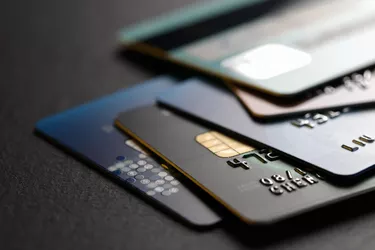
Major credit cards are those that belong to one of the four largest credit card companies: Mastercard, Visa, American Express and Discover. These credit card networks are separate from the institutions that offer the cards. For example, you might get a Visa through Chase Bank, or a Discover card through Bank of America. To complicate things even further, these networks may also offer cards directly through their own banks.
Major Credit Cards
Video of the Day
The four major credit card companies act as networks that determine where cards can be used and help to make sure payments are processed and transferred efficiently. Businesses choose which of the four major networks they want to accept, which is why some stores will take certain cards and not others. According to WalletHub, out of the four major networks, Visa has issued the most cards (336 million), followed by Mastercard (231 million), then Discover (75 million) and American Express (53.7 million).
Video of the Day
While these four networks dominate much of America and Europe, there are other major credit card networks – in India and China, for example – that cover other areas of the world. Most credit cards can be used in other nations, sometimes for a small fee.
Credit Card Issuers
Unrelated banks offer credit cards connected to the four networks. For example, in 2021 Capital One had nearly 100 million cards in circulation, with Chase following closely in second with 92 million cards. Chase has just over 16 percent of the market share, with Bank of America (11.8 percent), Citibank (11.7 percent) and American Express (11.6 percent) nearly equal. It's important to know the issuer of the card as well as the network it's on. While the network determines where you can use the card, the issuer controls the terms of the account, receives payments and should be contacted if there's a problem with the account.
Other Credit Cards
A number of individual stores offer their own credit cards, often with rewards attached for using that particular card in their own store. For example, Target offers a branded credit card that gives a 5 percent discount on most Target purchases, as well as free shipping and additional return time for customers who sign up. These cards usually aren't associated with any of the major credit card networks, although they're offered through banking institutions like the other cards. The benefit to opening these cards mainly revolves around the rewards and bonuses they provide. The downside is that having a number of small credit accounts can be hard to keep track of. Furthermore, having too many cards might impact your credit report.
What to Look for in a Credit Card
If you're shopping around for a new card, there are a number of factors you should consider in order to determine which card is the best one for you. Check the annual fee and the APR (annual percentage rate), which indicate how much the card is going to cost you both annually and if you have to carry a balance on the account.
Many cards now offer rewards through points or cash back, so you'll also want to compare those as well. The best cashback cards may offer revolving rewards or category-specific cash back.
Certain cards focus on the kind of rewards offered, such as in travel-specific cards, while others offer a percentage back on all purchases. If you have a shorter credit history, look for cards labeled as introductory. The terms won't be as good as cards offered to someone with established credit, but they'll help you start to build a credit history.